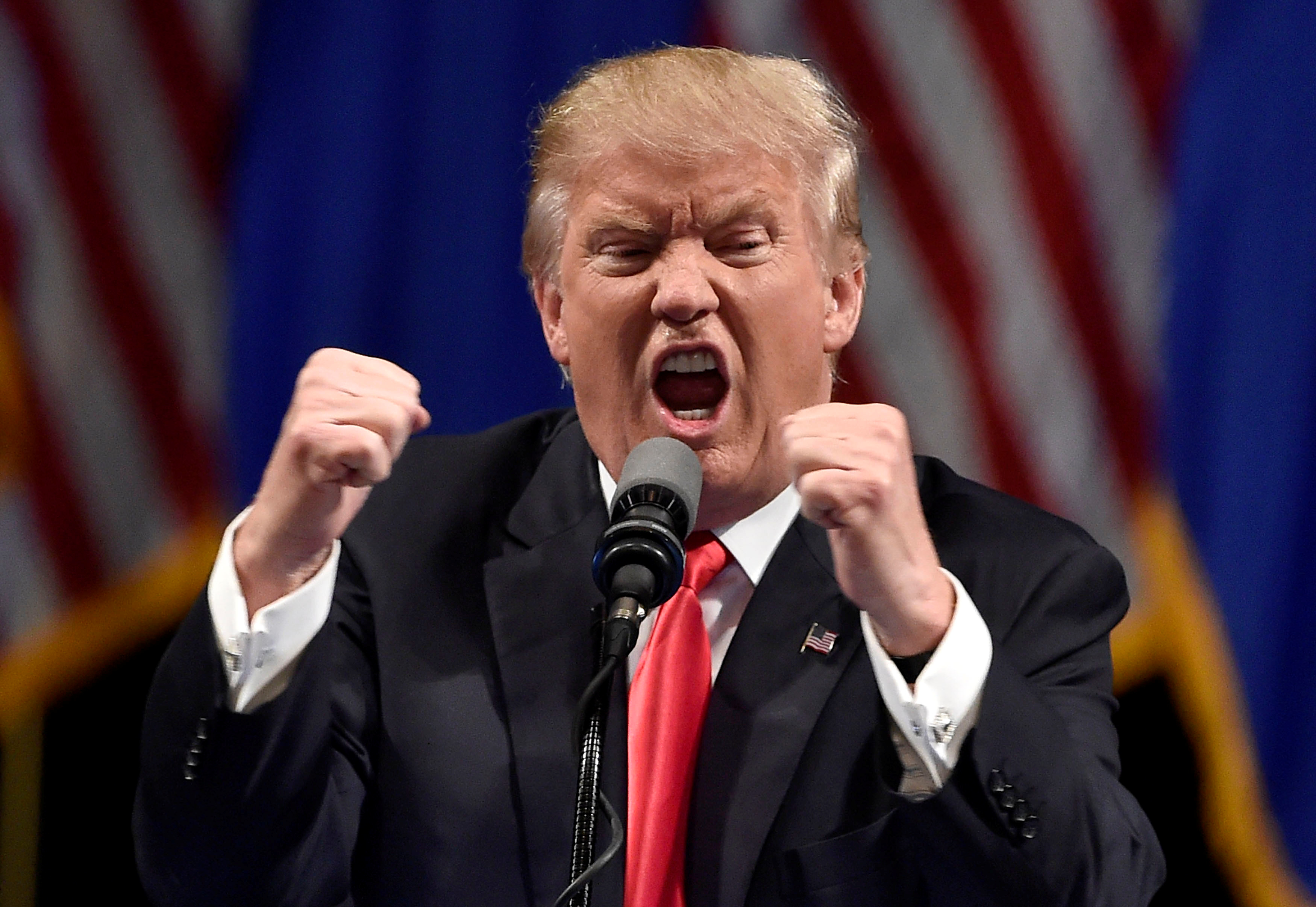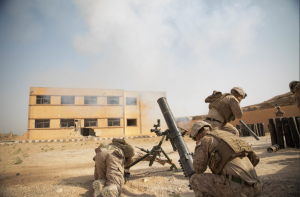by Charles Davis
“My original instinct was to pull out,” he said. “And historically, I like following my instincts.”
That was U.S. President Donald Trump, talking about Afghanistan, announcing on Aug. 21 that he was prepared to deploy thousands more of our cisgender boys and girls in a 15-year war to bring peace, siding with the generals and ignoring centuries of imperfect but time-honored advice on foreign relations.
The rhetoric, in a prime-time address, was George W. Bushian. “A hasty withdrawal,” he declared, “would create a vacuum that terrorists, including ISIS and al-Qaeda, would instantly fill just as happened before Sept. 11.” Rather than get out, Trump revealed he would be staying, but harder.
“Retribution will be fast and powerful, as we lift restrictions and expand authorities in the field,” by which he meant limits on the use of force intended to protect the lives of innocents (and we’ve already “shot an amazing number of” those, according to the former Commander of U.S. Forces in Afghanistan, Stanley McChrystal).
This–killing whomever Trump is calling a terrorist, and doing it good and fast–is what the president of the United States repeatedly promised on the campaign trail. Yet some call it a betrayal.
On Breitbart, the far-right website led by recently deposed Trump advisor Steve Bannon, Trump’s decision to send more troops to the graveyard of empires was a “flip-flop” and embrace of “unlimited war.” And, as The Daily Beast noted, Mike Cernovich, a far-right blogger who sells a proprietary brain serum, blamed son-in-law Jared Kushner and the generals for overturning the result of an election.
But, Trump maintained–correctly, as it happens–that there is no real conflict between what he’s doing now and what he promised back then, before he became commander in chief. “We are not nation-building again,” he assured the country. “We are killing terrorists.”
Anyone running for president runs against the foreign policy of the other team. Democrats run against Republicans’ wars and vice versa; Trump critiqued them both, coming out against Bush’s invasion of Iraq, but also against Obama’s withdrawal.
Some, forgetting that all presidents run against the wars they typically start or accelerate, and that Bush himself campaigned against limp-wristed liberal “nation-building,” confused this for a principled stance of non-intervention–a commitment to “fewer wars,” in the words of The Intercept’s Glenn Greenwald, albeit ones fought more brutally. But to impute any sort of principle on to an unscrupulous billionaire with the intellectual curiosity of a golden toilet was always a brazen error in judgment, be one a supporter or just an anti-liberal contrarian.
There are reports that Trump was uneasy with escalating in Afghanistan (he’s already escalated in every other theater, from Syria to Yemen to Somalia), and that it was the generals to whose wisdom he campaigned on deferring that persuaded him to stay the course. But on Afghanistan, Trump had already shifted on the campaign trail from a position of skepticism of the mission to skepticism of retreat. “I think you have to stay in Afghanistan for a while,” he remarked during a March 2016 debate.
But a stated commitment to intervention, followed by an escalation, is not enough to dissuade some from speculating that unelected forces are steering an elected government away from a path of peace. When President Obama–who campaigned on escalating in Afghanistan–escalated in Afghanistan, there was similar talk of an unelected “deep state” committed to perpetual war at the expense of democratic input on foreign policy. Those who didn’t wish to believe that they had been wrong about the president’s foreign policy agenda, ignoring the things he actually said or dismissing his campaign speeches as expedient rhetoric, were eager to embrace this narrative.
As with Obama, Trump was never opposed to the national security state; he was opposed to someone else having power over it. With respect to Afghanistan, “Trump’s private deliberations,” The Washington Post reported on Aug. 21, “revealed a president unattached to any particular foreign-policy doctrine.” His interest, the report claimed, was being “seen as a strong and decisive leader.”
The deep state, or the generals with whom Candidate Trump promised to surround himself, did intervene, however. The recently deposed Bannon had put forward what some have portrayed as an alternative to war: privatizing it. Instead of sending more U.S. soldiers, the U.S. government could mask its presence, and save a few dollars, by sending more mercenaries. Erik Prince, the founder of Blackwater USA, the brother of Education Secretary Betsy DeVos, and the Trump administration’s secret Seychelles liaison to the Russian government, would become this White House’s de facto viceroy in Afghanistan.
That Breitbart would cast this in non-interventionist terms of “America First” shouldn’t surprise, but no one else should accept the framing. The peaceful alternative to a soldier is not a mercenary; it might be a diplomat, but Trump is slashing the State Department and hasn’t replaced the last U.S. envoy to the region, who left in June. And while mercenaries save money, they do not save lives, something even a militarist can see.
Defense Secretary James Mattis “and other military leaders were deeply suspicious of handing over any responsibility to private companies,” the Post reported, “due to the controversies that dogged Blackwater and others in Iraq.” One thing that was controversial, for example, was when mercenaries opened fire on unarmed civilians in Nisour Square, Baghdad, killing over a dozen people for no apparent reason. The killers were tried for murder, but a court overturned their convictions, deeming their prison sentences to be “cruel and unusual punishment.”
There’s no reason to believe a cheaper, less transparent force of mercenaries in Afghanistan would constitute any less of an intervention; there’s reason to believe, by contrast, that these soldiers of fortune would in fact kill more innocents with greater impunity. It’s true that forces other than a president’s own mind influence their decisions, but people run for the highest office on the basis that they are the best ones to make them. And if opposition to war is motivated by opposition to needless death, and not just on the U.S. side, then the generals or the deep state or whatever one wants to call Trump’s advisors intervened for a mildly lesser evil.
Charles Davis is a writer in Los Angeles. Follow him on Twitter: @charliearchy






A salient and sad fact of the Afghan quagmire is simply that the US has created a hugely expensive governing structure that Afghanistan itself cannot support. Tragic, to be sure.
Indeed! Poor has to be obedient or even suffer more!
This is the beginning of the quagmire! Wait until the mercenaries set up a tunnel of armed men securing other mercenaries for stealing precious resources, opium and heroine from Afghanistan to the west! So who’s going to get a kickback?
This was a huge and humiliating defeat for Trump – precisely because it was a “mildly lesser evil”. It’s funny that he had to frame it as ‘killing terrists’ for the sake of his followers. In fact it was a classic neocon move that Hillary would have done and exactly what the Trumpkins opposed. They wanted mercenary armies and ‘bomb the hell out of them’ and all out nuke war in the middle east. Now the generals will make some attempt to nation build with good but misguided intentions, and hopefully the country will appreciate the sentiment but resist and eventually pull out. All very conventional.
The Bannon-Trump fracture is a mortal blow to the nihilist/apocalyptic movement and I don’t see why you’d play it down.
So what should we do in Afghanistan? Same as everywhere else: support factions that support freedom of speech, religion, and press – and abandon the ones that don’t.